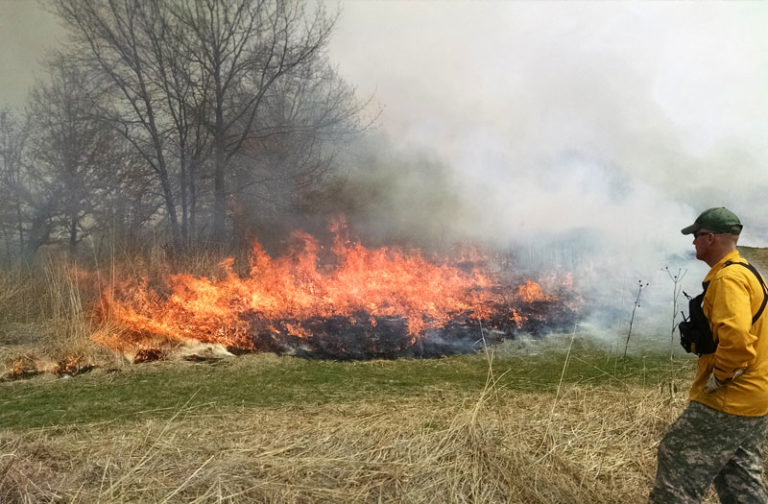
Jan Axelson
Friends of Cherokee Marsh
Did you notice the flames this spring at Cherokee Marsh, Warner Park and Lake View Hill Park? The Madison Parks Division and Dane County Parks use fire as a tool to maintain prairies, open woods and even marshes on our public lands. The Central Wisconsin Center also burned 3 acres of prairie on their grounds along the east side of Green Avenue.
Without periodic burns, aggressive plants such as honeysuckle and buckthorn crowd out the native grasses, wildflowers and other plants that provide food and shelter for wildlife and add much beauty to our natural areas.
Before European settlement, lightning sparked fires on the landscape, and evidence shows that Native Americans also set fires to maintain hunting grounds and travel routes. Many native plants have deep roots and other defenses to withstand fire.
The fires, called prescribed burns, are set in early spring and late fall to avoid interfering with nesting birds or emerging spring flowers. The burn crews include certified wildland firefighters who are trained in burning techniques and safety. Burns occur only on days when winds are in the desired direction — away from neighborhoods — and not too strong. Mowed or cleared paths and the Yahara River provide fire breaks.
On burn day, the fire department is notified. The crew uses drip torches to light a line of fire while sentries stand watch and extinguish any flames that catch outside the target area. A crew member remains on-site until all flames are out.
This spring, thanks to favorable weather and an increase in crew size due to cooperation with other city parks units, the city’s crew was able to burn almost 300 acres in Cherokee Marsh Conservation Park.
Most burns begin in late morning or early afternoon, but after a weather-related cancellation at Lake View Hill Park this year, County Naturalist Lars Higdon and a team of volunteers conducted a successful burn in late afternoon.
Madison Parks uses the reverse-911 system to notify neighbors about planned burns. At one site, a young girl and her mother took the opportunity to set up camp on their deck on Wheeler Road to watch. Madison Parks Conservation Resource Supervisor Paul Quinlan reported, “That day, we arrived to find the mother and daughter already waiting for us to start. Pretty cool thing to do on spring break, if you ask me.”